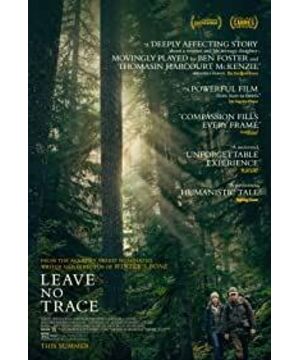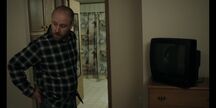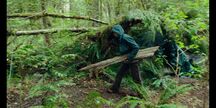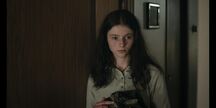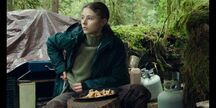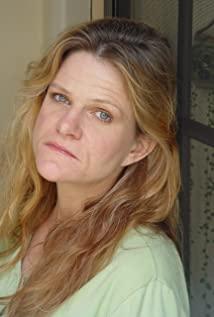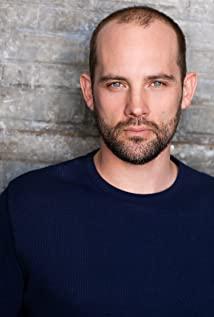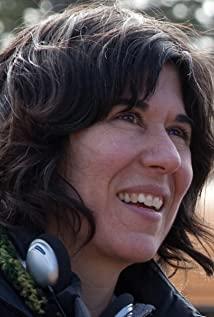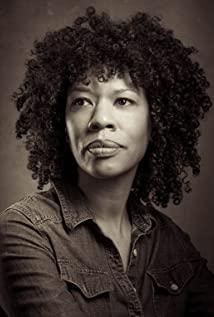Although since its release in June this year, American female director Debra Granick's "Leave No Trace" has received a lot of praise, and some film critics even considered it "one of the best movies of 2018". But from the audience's point of view, this should not be regarded as a "good-looking" movie.
"Leave No Trace" stars Will and his daughter Tom, a veteran of post-traumatic stress disorder (PTSD). With PTSD and a sense of fear and disgust for crowds and social life, Will and his daughter live a reclusive life in Forest Park.
But after being accidentally discovered, the police and social workers forced them to the rescue agency and arranged work and accommodation for them. After being unable to adapt, Will finally escaped back to the forest with his daughter.
It's a slightly slow-paced film, and from a narrative perspective, it's more of a bland and slightly dull documentary.
Because of the lack of background and descriptions of factors that could pose a threat to reclusive life, even when the father and daughter were chased and taken away by the police with police dogs, they could not create the slightest sense of tension. In the secluded life, except for the wolf howls at night, the film has never seen any beasts that would pose a threat to their personal safety.
This isn't a film celebrating pastoral life, nor is it a wilderness survival manual. Although there are many details of the seclusion life in the film, it seems that it is not enough to satisfy people's curiosity, but unfortunately, such details are different from those works that affirm the tendency of reclusive life - they tell about the wonderful things of the secluded life. At the same time, the director is not shy about expressing the difficulties and dilemmas that this kind of life needs to face at the same time.
For example, the frustration of not being able to start a fire because the rain has wet the firewood, the bitterness of starvation because of the lack of materials, the daughter who was almost frozen due to the cold, and the thrill of almost dying from a fall in the wild. The reverse description of the life of the father and daughter is actually more of a positive description.
In other words, what the director actually wants to do is to express this kind of life truthfully. In order to break the audience's beautification of the imagined secluded life, he even devotes more attention to the more difficult side of this kind of life- - In fact, pain is far more profound than happiness for human feelings and memories.
However, even in the face of such difficulties, why are the father and daughter reluctant to return to the so-called "normal" order of life?
Forest Park is state land, and Will and Tom were taken to a rescue facility by police and social workers after they were discovered. Because Tom was underage and isolation was considered "abnormal," Will had to do extensive psychological testing as required to prove that he was mentally healthy enough to raise Tom, and Tom was also subjected to extensive testing to prove that she was mentally normal. healthy.
After completing these tests, Will and Tom were sent to work and live on a Christmas tree farm.
Similarly, the film presents their life on the farm from a plain and objective perspective: Will, who suffers from PTSD, endured the noise of chainsaws and helicopters, received caring questions and gifts from social workers, Introduce and get to know each other with strangers at the prayer meeting of the day.
There is a section in the video, after the prayer, Tom looked at the small leaflet handed out by the church with great interest and asked Will what it meant to go to worship on Sunday, Will replied: "We went because Walters (social worker) asked Let's go. You dress up, show up on Sunday, and people will believe something about you."
Tom, who understood, said dejectedly: "So they won't ask a lot about our lives? About our previous lives."
The so-called mainstream is probably the best at making such a distinction-it is easy to give "correct" to something "looks different" or someone "different from others" based on the value inclination of the mainstream group Or "incorrect", "normal" or "abnormal" judgments, even if this event or this person has no impact on others, but it can't stop people from paying attention and commenting.
Therefore, it is abnormal to be "not gregarious", "not good at communicating" is abnormal, and "not suitable for living in groups" is abnormal. In the present moment, "not falling in love, not getting married", "not having children", and "not buying a house or a car" are not normal and messed up.
Because of this, Will and Tom's escape is both reasonable and expected.
However, the short life on the farm has left a deep impression on Tom: comfortable housing, abundant materials, friendly friends and interesting daily life on the farm.
Although the description of the seclusion life in the film is not lacking in fun, although every frame of the large forest scenery is enough to be used as a wallpaper, for Tom, who is 13 or 14 years old, the communication between people is obviously more attractive.
The social worker told Tom at the relief agency: "School can teach you how to communicate and get along with people.
Human beings, after all, are social animals, and those who can endure living in isolation will never be the majority at any time.
So at the end of the film, Tom made the choice to stay in the crowd, and Will also stepped into the wild forest alone with his luggage. The father and daughter, who were once tightly bound and tried to escape "not to be separated", finally chose to separate, and this separation is undoubtedly both Will's respect for Tom and Tom's respect for Will.
This kind of respect is probably what the director wants to express most.
View more about Leave No Trace reviews


